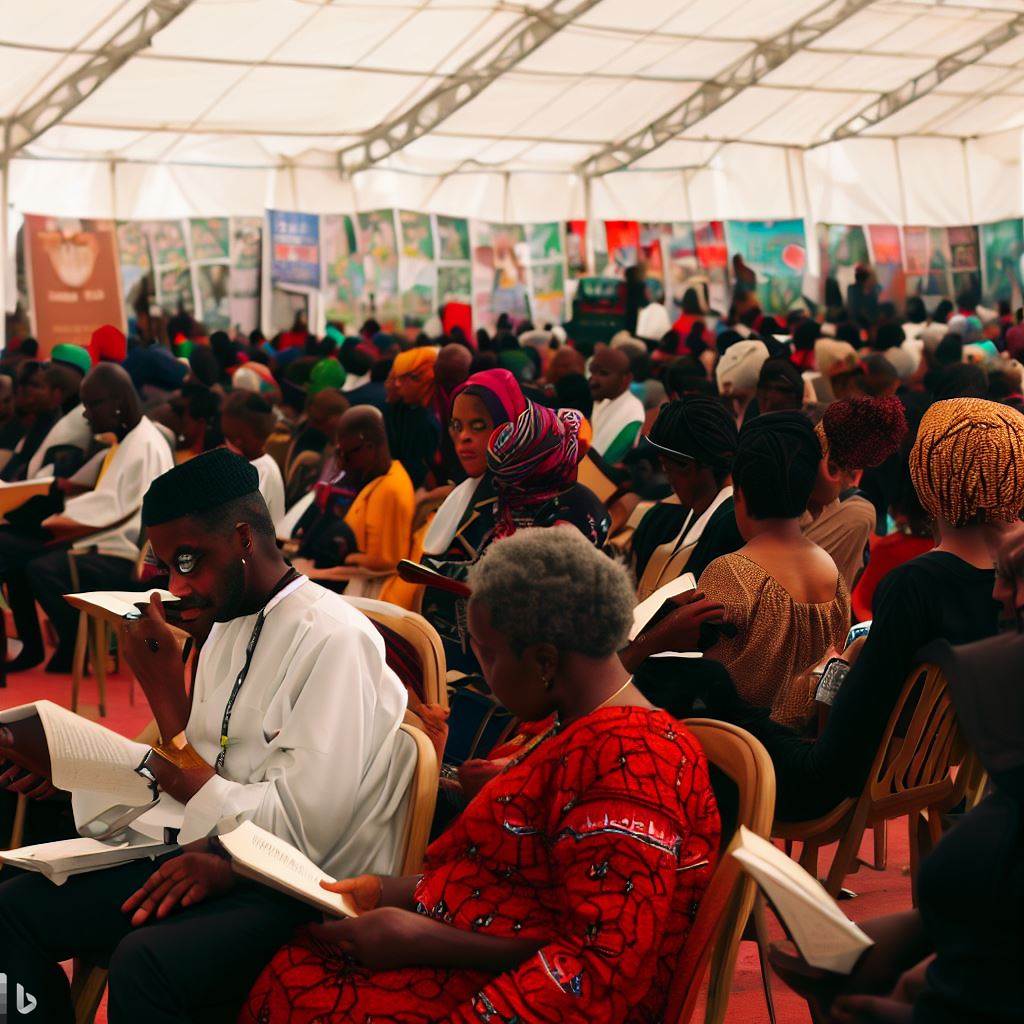Introduction
Digital writing refers to the use of technology to compose, edit, and publish written content.
Examining digital writing in Nigeria is crucial due to its increasing relevance in various aspects of society.
In today’s digital era, writing has evolved to encompass various forms that rely on technology for composition, editing, and publication.
This is known as digital writing. It includes writing for websites, social media, blogs, online forums, and other digital platforms.
Examining the state of digital writing in Nigeria is of utmost importance. Nigeria, being the most populous country in Africa, has witnessed significant growth in the use of digital technologies.
As a result, digital writing has become a prevalent mode of communication and self-expression for Nigerians.
Firstly, understanding the state of digital writing in Nigeria provides insights into the changing landscape of communication in the country.
With the adoption of digital technologies, Nigerians can connect and share information faster and more efficiently than ever before.
Examining the trends, challenges, and opportunities in digital writing helps us comprehend the impact of technology on Nigerian society.
Secondly, digital writing offers various opportunities for Nigerian writers. It allows them to reach larger audiences and establish their presence in the digital space.
Exploring the current state of digital writing helps identify the skills and strategies needed for success in this rapidly evolving field.
Lastly, examining digital writing in Nigeria enables the identification of potential gaps and areas for improvement.
It helps stakeholders, such as educators, policymakers, and content creators, develop strategies to enhance digital literacy and ensure that Nigerians are equipped with the necessary skills to thrive in the digital age.
Historical context of digital writing in Nigeria
A. The development of digital writing in Nigeria
- Nigeria’s digital writing journey started with the advent of the internet in the early 1990s.
- It brought new opportunities for expressing thoughts and ideas through digital platforms.
- The Nigerian government recognized the potential of digital writing and invested in infrastructure.
- With time, more Nigerians gained access to computers and the internet, fostering digital literacy.
B. Challenges faced during the initial stages
- Limited internet penetration hindered widespread adoption of digital writing.
- High cost of internet access and lack of affordability for many Nigerians posed challenges.
- Technological constraints, such as slow internet speeds, affected the efficiency of digital writing.
- Limited awareness and understanding of digital writing among the general population.
C. Growth and advancement in digital writing practices
- Nigeria witnessed significant growth in digital writing with the increasing availability of smartphones.
- Social media platforms like Twitter, Facebook, and Instagram became popular avenues for digital expression.
- Bloggers emerged as influential voices, utilizing digital writing to share opinions and explore various topics.
- The rise of online news platforms and digital media houses further propelled digital writing practices.
- Mobile apps and platforms like Nairaland and Bella Naija provided avenues for user-generated content.
- Digital writing played a crucial role during political movements and protests in Nigeria.
- The government, recognizing the power of digital writing, started leveraging it for governance and e-governance.
- Organizations and individuals began embracing digital writing as a tool for marketing and communication.
- Digital writing workshops, training sessions, and courses have become more prevalent in Nigeria.
The historical context of digital writing in Nigeria showcases its progression from limited accessibility and awareness to widespread adoption and influence.
Despite initial challenges, advancements in technology and increased internet penetration have paved the way for the growth of digital writing.
It has transformed communication, activism, governance, marketing, and various other aspects of Nigerian society. As digital literacy continues to grow, the future of digital writing in Nigeria looks promising.
Read: The Impact of Digital Media on Editing in Nigeria
Current state of digital writing in Nigeria
A. Common platforms and tools used for digital writing
- WordPress is one of the most popular platforms used by Nigerian bloggers.
- Social media platforms like Twitter and Instagram are also commonly used for micro-blogging.
- Online publishing tools such as Medium and LinkedIn are gaining popularity.
- Content management systems like Joomla and Drupal are used by some Nigerian websites.
- Email marketing tools like Mailchimp are used for digital newsletters and promotional content.
B. Popular digital writing genres in Nigeria
- Blogging remains the most popular digital writing genre in Nigeria.
- News articles and opinion pieces are widely written and shared online.
- Short stories and poetry are also popular among Nigerian digital writers.
- How-to guides and tutorials are created to share knowledge and expertise.
- Product and service reviews help Nigerian consumers make informed decisions.
C. Influence of social media on digital writing trends
- Social media has revolutionized the way Nigerians consume and share written content.
- Twitter threads and Facebook posts have become popular storytelling formats.
- Instagram captions and hashtags are used creatively to engage with audiences.
- Online discussions and debates are sparked by viral social media posts.
- Social media influencers have a significant impact on digital writing trends in Nigeria.
D. Integration of local languages in digital writing
- Nigerians are embracing the use of local languages in their digital writing.
- Bloggers are creating content in Yoruba, Igbo, and Hausa to reach wider audiences.
- Social media platforms have features that allow for the use of Nigerian languages.
- Translation tools and language learning apps are being utilized for local language integration.
- The use of local languages in digital writing promotes cultural preservation in Nigeria.
Digital writing in Nigeria has significantly evolved in recent years. Blogging, news articles, and opinion pieces remain popular genres.
Nigerian writers are leveraging social media platforms and tools like WordPress, Twitter, and Instagram for their digital content.
The integration of local languages also plays a crucial role in reaching wider audiences and preserving Nigerian culture.
As technology continues to advance, the state of digital writing in Nigeria will continue to grow and adapt to new trends and tools.
Read: The Influence of Nollywood on Film Editing in Nigeria
Impact of digital writing on Nigerian society
A. Effects on communication and self-expression
Digital writing has revolutionized communication in Nigeria, allowing individuals to express their thoughts and ideas more freely.
It has created platforms for people to engage in meaningful conversations and share diverse perspectives.
Digital writing has given a voice to marginalized groups, enabling them to express their concerns and seek social justice.
It has also led to the proliferation of creative content and storytelling, enriching Nigerian culture and heritage.
B. Democratization of information and knowledge sharing
Digital writing has democratized access to information and knowledge in Nigeria.
With a few clicks, individuals can access a wealth of resources, empowering them to learn and grow in various fields.
News articles, research papers, and educational materials can be easily disseminated, narrowing the information gap in society.
The ease of online knowledge sharing has also fostered collaboration and innovation among Nigerian academics and professionals.
C. Economic opportunities created through digital writing
Digital writing has opened up new avenues for economic growth and entrepreneurship in Nigeria.
Many individuals have turned their writing skills into profitable online businesses, offering services such as content creation and copywriting.
Blogging and social media influencers have emerged as powerful marketing tools for brands, contributing to the growth of the digital economy.
Freelancers and remote workers have also benefitted from the flexibility and global reach of digital writing platforms.
D. Empowerment and amplification of diverse voices
Digital writing has empowered individuals from diverse backgrounds to share their stories and experiences.
It has given a platform to marginalized communities, shedding light on social issues and advocating for change.
Through hashtags and viral campaigns, Nigerian voices have resonated globally, bringing attention to important causes.
Additionally, digital writing has fostered inclusivity and representation, challenging existing stereotypes and promoting diversity in media and literature.
The impact of digital writing on Nigerian society has been profound. It has revolutionized communication, enabling self-expression and fostering meaningful discussions.
The democratization of information and knowledge sharing has empowered individuals to learn and collaborate.
Moreover, digital writing has created economic opportunities, while amplifying diverse voices and promoting social change.
As Nigeria continues to embrace the digital age, the transformative power of writing in the digital realm will only grow stronger.
Read: Nigeria’s Top Editing Courses: A Comprehensive Review

Challenges and Limitations of Digital Writing in Nigeria
A. Accessibility and Digital Divide Issues
- Limited access to digital devices and internet connectivity hinders widespread participation in digital writing.
- High costs of internet data and devices pose a barrier to entry for many Nigerians.
- Disparities in access between urban and rural areas perpetuate the digital divide in the country.
- Limited availability of electricity in some regions makes it challenging to engage in online writing consistently.
- Language barriers and limited localization of digital content restrict access for non-English speakers.
B. Quality Control and Misinformation Challenges
- The abundance of unverified and misleading information online undermines the credibility of digital writing.
- The lack of standardized quality control mechanisms leads to the proliferation of inaccurate content.
- Limited accountability for authors and publishers of digital content contributes to the spread of misinformation.
- The ease of anonymous publishing enables the dissemination of false narratives and malicious intent.
- Relatively low digital literacy levels make it difficult for readers to discern between reliable and unreliable sources.
C. Lack of Infrastructure and Technological Barriers
- Insufficient digital infrastructure, including inadequate broadband coverage, hampers the growth of digital writing.
- Limited availability of reliable electricity and frequent power outages disrupt the online writing process.
- Outdated technology and slow internet speeds impede the creation and dissemination of digital content.
- Insufficient support for content creators, such as digital writing tools and platforms, restricts their potential.
- Limited access to software and hardware required for digital writing creates technological barriers for aspiring writers.
D. Need for Digital Literacy and Skills Development
- Limited digital literacy skills among the population hinder effective participation in digital writing.
- Insufficient awareness of intellectual property rights and copyright laws poses challenges for content creators.
- Inadequate training and education programs on digital writing limit the growth and development of writers.
- Lack of understanding of online etiquette and responsible digital behavior affects the quality of digital discourse.
- Insufficient integration of digital writing in educational curricula restricts the acquisition of necessary skills.
While digital writing in Nigeria has witnessed considerable growth, several challenges and limitations persist.
Accessibility issues, quality control concerns, infrastructure gaps, and the lack of digital literacy hinder the development and widespread adoption of digital writing practices.
To overcome these challenges, it is crucial to address the digital divide, implement quality control measures, improve infrastructure, and prioritize digital literacy and skills development initiatives.
Through concerted efforts, Nigeria can harness the potential of digital writing for social, economic, and cultural development.
Read: Spotlight on Nigeria’s Tech Editors: A Closer Look
Future prospects and recommendations
A. Potential growth opportunities for digital writing in Nigeria
- Expansion of internet penetration and access to technology will unlock new avenues for digital writing.
- Mobile device usage is on the rise, creating a larger audience for digital content.
- E-commerce growth presents opportunities for writers in content creation for online businesses.
- The emergence of social media platforms provides a platform for writers to reach a wider audience.
B. Importance of digital education and skills training
- Investing in digital education and skills training will equip writers with the necessary tools for success.
- Digital literacy programs can help writers adapt to changing writing trends and technologies.
- Training in SEO, content marketing, and digital storytelling will enhance the quality and visibility of Nigerian digital writing.
C. Collaboration and networking for knowledge exchange
- Building a community of digital writers will foster collaboration and sharing of ideas.
- Networking events and workshops can facilitate knowledge exchange and enhance professional growth.
- Online platforms and forums dedicated to digital writing can serve as spaces for interaction and learning.
D. Government and private sector support for digital writing initiatives
- Government funding and grants can encourage the development of digital writing platforms and initiatives.
- Private sector partnerships can provide financial support and mentorship for aspiring digital writers.
- The establishment of incubation centers can nurture and support the growth of digital writing startups.
The future prospects for digital writing in Nigeria are promising.
The potential growth opportunities, importance of digital education and skills training, collaboration and networking, and government and private sector support all contribute to the development of a thriving digital writing sector.
By harnessing these recommendations, Nigeria can emerge as a hub for digital writing, showcasing its rich literary tradition in the digital era.
Conclusion
key points discussed
- The state of digital writing in Nigeria has experienced significant growth in recent years.
- Challenges such as limited internet access and digital literacy need to be addressed in Nigeria.
- Various initiatives and organizations are working towards promoting digital writing in Nigeria.
- The presence of social media platforms has had a positive impact on digital writing.
Importance of continued examination and support for digital writing in Nigeria
- Continuous evaluation and research are necessary to track the development of digital writing.
- Government and private sector support is crucial for the sustainability of digital writing initiatives.
- Investing in digital infrastructure is essential for bridging the digital divide and promoting inclusivity.
Closing thoughts on the future of digital writing in the country
The future of digital writing in Nigeria is promising and holds immense potential for creativity, innovation, and cultural preservation.
With continued support and collaborative efforts, digital writing will flourish and contribute to the growth of the nation’s literary landscape.




